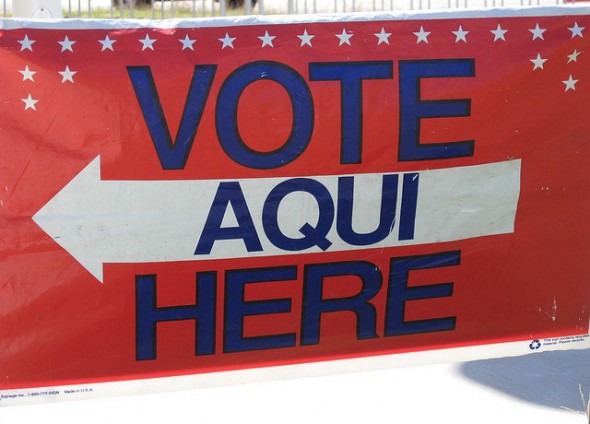City Seeks Bilingual Poll Workers for April 1 Election
Federal rules and increase in Latino voters push city to increase staff.

Milwaukee needs Spanish-speaking individuals to help with the election this spring. (Photo by Kristen Lopez)
On April 1, election day for local judicial races, Rhonda VanPembrook will use a personal day at her job to serve as a poll worker for the city of Milwaukee. She’ll direct residents to the right line, check paperwork and assist with same-day registration. To anyone needing help, she’s liable to ask, “Puedo ayudarle?”
Because of the growth of the Latino community in Milwaukee, the federal government says the city must provide bilingual poll workers and information about the election in Spanish, as well as a Spanish-language ballot. Last year’s elections marked the first time the city implemented the new requirement.
“Voting is an intimidating process for many people, whether they’re English proficient or not. For certain voters you can definitely notice a sense of relief when the materials are in Spanish and there’s someone there to assist,” said VanPembrook, adding that the vast majority of voters that she encounters speak some English.
Neil Albrecht, executive director of the Election Commission, said the city has hired about half of the 110 bilingual poll workers for April’s election. That number could change for the November gubernatorial election.
“It’s right about where we would expect to be,” Albrecht said.
Jesus Hernandez, the Election Commission’s full-time bilingual poll worker coordinator, will be working during the next two months to fill the remaining vacancies.
The bilingual poll worker requirement is in Section 203 of the Voting Rights Act. After each census the federal government identifies local government units with a single-language group of voting-age citizens that either totals more than 10,000 people or is more than 5 percent of the voting-age population. Any such jurisdictions are subject to Section 203.
Milwaukee was the first, and remains the only jurisdiction in Wisconsin, affected by Section 203.
According to census data, Latinos make up 17 percent of the city’s population, or more than 103,600 total. That’s an increase of about 44 percent in the last 10 years.
City officials said bilingual poll workers are assigned to voting sites with a significant Spanish-speaking population, identified by a surname analysis.
The surname analysis of all registered voters in the city, conducted with support from the Wisconsin Government Accountability Board, is completed prior to each election cycle to ensure that any shifts in population or surges in registration are quickly identified and bilingual election worker staffing is adjusted accordingly.
Within the city’s 327 voting wards, 85 wards meet the criteria for bilingual poll worker staffing, Albrecht said. Those 85 voting wards are assigned to 62 target voting sites. When target sites are filled, additional bilingual poll workers are assigned to sites where language assistance has been requested in past elections.
The city also maintains an election day bilingual hotline, which allows voters at non-target sites to receive over-the-phone language assistance from one of two bilingual Election Commission employees.
Milwaukee’s bilingual poll workers are required by law to receive a standard three-hour training course on all job-related duties, and an additional 30-minute overview of Section 203.
Albrecht wouldn’t speculate whether the city could face penalties for failing to meet the required number of bilingual poll workers. He said, however, that since implementation of Section 203, the Election Commission has worked closely with the U.S. Department of Justice, the Government Accountability Board and the City Attorney’s Office to ensure compliance.
This story was originally published by Milwaukee Neighborhood News Service, where you can find other stories reporting on fifteen city neighborhoods in Milwaukee.




















There is one contested race. Why are we voting for judges again? Shouldn’t we have a board or something that appoints them? Seems like a big waste of time and resources.